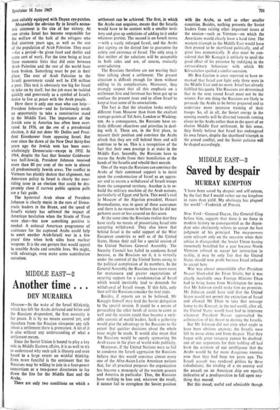Another time. . .
MIDDLE EAST-2
DEV MURARKA
Moscow—in the wake of the Israel blitzkreig, which has left the Arabs defeated and bitter and the Russians despondent, the first necessity is for peace. It is by no means assured yet, and therefore from the Russian viewpoint any talk about a settlement there is premature. A lot of it is also without any understanding of what a settlement means.
Since the Soviet Union is bound to play a key role in Middle Eastern affairs, it is as well to try to understand why such talk is illusory and even based to a large extent on wishful thinking. Even more fanciful is the sentiment that the Russians may be willing to join in a four-power consortium or a two-power directorate to lay down the line for the Middle East and the Arabs.
There are only two conditions on which a
settlement can be achieved. The first, in which the Arabs can acquiese, means that the Israelis would have to be content with a smaller terri- tory and give up ambitions of adding to it under whatever pretext. The second is on Israeli terms —with a vastly enlarged Israel, and the Arabs just signing on the dotted line to guarantee the safety and existence of Israel. The only snag is that neither of the solutions will be acceptable to both sides and are, of course, mutually contradictory.
The Russians therefore are not wasting their time talking about a settlement. The present situation is difficult enough for them without adding to its complications. Moreover, they strongly suspect that all this emphasis on a settlement first and foremost has been got up to confuse the present issue and to allow Israel to keep at least some of its annexations.
The fact is that the situation looks entirely different from Moscow than from the exultant vantage-points of Tel Aviv, London or Washing- ton. As a consequence, the Russians have en- tirely different objectives and priorities in deal- ing with it. These are, in the first place, to reassert their position and convince the Arabs afresh that they are still behind them and will continue to be so. This is a recognition of the fact that their own prestige is at stake in the Middle East. Secondly, the Russians have to rescue the Arabs from their humiliation at the hands of the Israelis and rebuild their morale.
One of the ways the Russians can convince the Arabs of their continued support is to insist upon the condemnation of Israel as an aggres- sor and to secure a withdrawal of Israeli troops from the conquered territory. Another is to re- build the military machine of the Arab nations, particularly of Egypt and Syria. This week's visit to Moscow of the Algerian president, Houari Boumedienne, was in quest of these assurances and there is no reason to believe that he did not go home more or less assured on this score.
At the same time the Russians realise that they have really no means of pressurising Israel into accepting withdrawal. They also know that behind Israel is the solid support of the West European cOuntries as well as of the United States. Hence their call for a special session of the United Nations General Assembly. The Security Council has failed to condemn Israel because, as the Russians see it, it is virtually under the control of the United States owing to the political complexion of its members. In the General Assembly the Russians have more room for manoeuvre and greater expectations of securing support for a condemnation of Israel which would inevitably lead to demands for withdrawal of Israeli troops. If this fails, only then will the Russians consider the next steps.
Besides, if reports are to be believed, Mr Kosygin himself may lead the Soviet delegation to the special session. It could be a means of persuading the other heads of states to come as well and the session could thus become a verit- able summit of world leaders. Such a gathering would give the advantage to the Russians to the extent that quicker decisions about the whole issue might be made. It would also mean that the Russians would be openly sponsoring the Arab cause in the glare of world-wide publicity.
Moreover, if the United Nations were to fail to condemn the Israeli aggression the Russians believe that this would convince almost every one of the Afro-Asian-Latin American nations that, for all practical purposes the organisation has become a monopoly of the western powers and America in particular. Thus, the Russians have nothing to lose and, whatever the result, it cannot fail to strengthen the Soviet position
with the Arabs, as well as other smaller countries. Besides, nothing prevents the Soviet leaders from raising other important issues at the session—such as Vietnam—on which the Americans would clearly have a hard time. The western triumph in the Middle East would have then proved to be shortliynd politically, and of great loss economically. It also must be con- sidered that Mr Kosygin is unlikely to spoil the good effect of his presence by indulging in the extraordinary behaviour with which Mr Khrushchev spoiled a similar occasion.
Mr Ben Gurion is once reported to have re- marked that Israel can fight only three wars in the Middle East and no more. Israel has already fulfilled this quota. The Russians are determined that in the next round Israel must not be the winner. For one thing the Russians are likely to persuade the Arabs to be better prepared and to undertake more intensive training of their troops. So, all in all, the Soviet energy in the coming months will be directed towards coming closer to the Arabs rather than in the quest of an elusive Middle East settlement. In this sense, they firmly believe that Israel has endangered its own future, despite the shortlived triumph in the armed conflict, and the Soviet policies will be shaped accordingly.


































 Previous page
Previous page